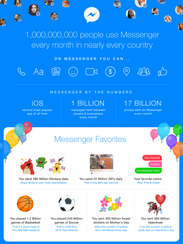
This article is more than
9 year oldSAN FRANCISCO — Messenger, Facebook's homegrown messaging app, has joined the 1 billion users club, achieving what is still a rare feat in the technology world.
Reaching such a large slice of the world's population "is a bit like hitting the lottery," says technology analyst Rob Enderle of the Enderle Group. "The odds really aren't in your favor."
But they are increasingly in favor of Facebook, which now has three apps with more than 1 billion monthly active users, and Google, which has seven, most recently Gmail.
That track record of making must-use apps is all the more remarkable because people routinely use only a handful of apps on their mobile devices. Facebook and Google, as today's dominant digital companies with reach around the world, have the best shot at crossing the 1-billion-users threshold. Still, they must create the kinds of experiences that consumers crave.
"Facebook and Google are running the show when it comes to making mobile apps that people want to download," says eMarketer analyst Debra Aho Williamson. "What they offer are apps that you want to use again and again and, quite frankly, that you need to use again and again. Very few apps can offer that."
Having 1 billion people use your app each month is worth its weight in gold when it comes to the business of making money on mobile devices. Just ask Facebook CEOMark Zuckerberg, who famously paid a staggering $19 billion for WhatsApp in February 2014. His reasoning: The popular messaging service was on track to reach 1 billion users. Two years later, it did. Facebook typically does not try to generate revenue from a service until it reaches the 1 billion-user threshold, according to Zuckerberg.
Facebook Messenger's 1 billion-user milestone is a significant achievement for Messenger chief David Marcus. The former PayPal exec joined Facebook two years ago when Messenger was still shy of 300 million users.
"It's not every day you get to wake up and come to work and have the opportunity to serve over 1 billion people," Marcus told USA TODAY. "That's just a great feeling, to have the ability to build things that are going to be used by so many people."
The Messenger app debuted in 2011, inspired by the messaging feature on Facebook. Messaging on Facebook was disabled in 2014, forcing people to use the Messenger app. Adding popular features such as making voice and video calls and sending money to friends has drawn in more users, Marcus says. Being a name-based messaging service gives Messenger another edge, Marcus says — no more fumbling around for phone numbers.
Messenger hit 1 billion users three months after hitting 900 million and 900 million three months after hitting 800 million.
It has been downloaded more than 1 billion times on Android. It's also the second most popular iOS app of all time, behind Facebook.
"Facebook Messenger definitely has momentum," Williamson says.

At 1 billion users, will it now face pressure to make money?
"We're not really under a ton of pressure to monetize," Marcus said. "We just need to do what's right for the ecosystem. We need to solve real problems for real people and then things will come together naturally."
Messenger is beginning to tap into its commercial potential. It's experimenting with ways businesses can communicate with users on Messenger, such as the recent launch of its chatbot platform, which now has 18,000 bots. And Williamson says she would not be surprised to see advertising on Messenger before year's end.
Follow USA TODAY senior technology writer Jessica Guynn @jguynn